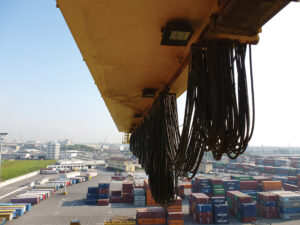Cranes
Cables designed for use in cranes play an essential role in maintaining connectivity and safety in challenging work environments. These cables facilitate effective communication between different critical control and power supply systems, thus supporting efficient and safe lifting and cargo transport operations.
In terms of their fundamental characteristics, these cables are designed to withstand extreme environmental conditions and offer exceptional durability, thereby reducing maintenance costs. Their ability to provide reliable connectivity is crucial to ensure the safe and continuous operation of cranes as a whole.
Additionally, the operational reliability of cables for cranes plays a fundamental role in preventing interruptions and failures in critical lifting systems. Their reliable performance ensures safety in lifting operations and efficiency in the overall operation of facilities.
Regarding the different types of cables used in cranes, these include those for electrical power, control, and signaling, each of which is tailored to specific needs to ensure smooth and efficient operation in various lifting operations.
As for regulation and standards, specific industry and safety standards define the rigorous requirements that these cables must meet to ensure mechanical strength, fire resistance, corrosion resistance, and moisture resistance, necessary for safe and reliable operation in challenging work environments.










